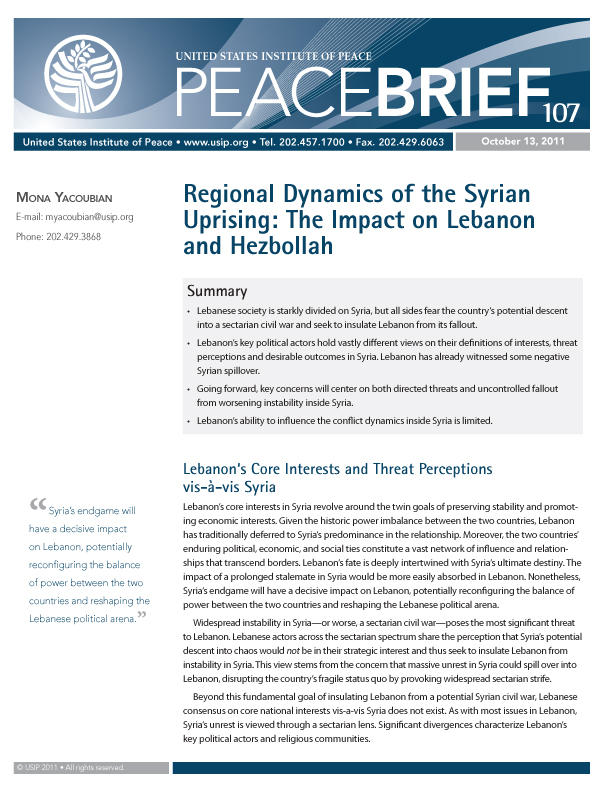This Peace Brief is part of a series examining the regional dimensions of Syria’s popular uprising. The Institute invited leading experts from the U.S. and across the Middle East to identify key vectors of influence Syria’s neighbors are bringing to bear on the conflict; to forecast how the on-going conflict in Syria will affect the delicate and volatile regional balance of power; and to examine how the Syrian opposition and the Syria regime are factoring in regional and cross-border dynamics.

Summary
- Lebanese society is starkly divided on Syria, but all sides fear the country’s potential descent into a sectarian civil war and seek to insulate Lebanon from its fallout.
- Lebanon’s key political actors hold vastly different views on their definitions of interests, threat perceptions and desirable outcomes in Syria. Lebanon has already witnessed some negative Syrian spillover.
- Going forward, key concerns will center on both directed threats and uncontrolled fallout from worsening instability inside Syria.
- Lebanon’s ability to influence the conflict dynamics inside Syria is limited.
About This Brief
This Peace Brief is part of a series examining the regional dimensions of Syria’s popular uprising. The Institute invited leading experts from the U.S. and across the Middle East to identify key vectors of influence Syria’s neighbors are bringing to bear on the conflict; to forecast how the on-going conflict in Syria will affect the delicate and volatile regional balance of power; and to examine how the Syrian opposition and the Syria regime are factoring in regional and cross-border dynamics.
The series was edited by USIP’s Steven Heydemann, Senior Adviser for Middle East Initiatives; and Scott Lasensky, a Senior Program Officer. Through this series, several related workshops and events held in September and October, and on-going programs that bring together experts, civil society figures and officials, the Institute aims to provide applied analysis and on-the-ground conflict management tools in support of political transitions across the Arab world.
This study on Lebanon was written by Mona Yacoubian, a Senior Advisor at the Institute’s Center for Conflict Management and director of USIP’s Lebanon Working Group.
Explore Further
- Turmoil in Syria: Reshaping the Middle East?
USIP publishes a series of briefs on how the Syrian uprising is affecting the regional neighborhood